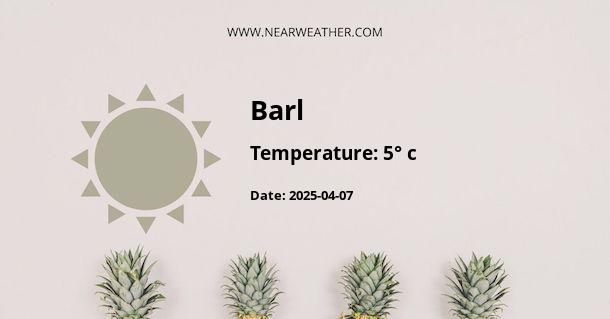Understanding the Climate and Weather of Barl, DE
Barl, DE, a region not typically found on the map, is presumed to be referencing a locality within Delaware (DE), United States. For the purpose of providing an accurate description, we shall consider the climate and weather patterns typical of Delaware. Nestled in the Mid-Atlantic region, Delaware experiences a moderate climate that varies slightly from the coastal areas to the inland regions. Employing the Köppen climate classification, Delaware's climate can be characterized as a humid subtropical climate (Cfa).
Seasonal Weather Variations
Delaware's proximity to the Atlantic Ocean greatly influences its weather patterns, presenting a year-round play of four distinct seasons — winter, spring, summer, and fall. Let’s delve deeper into each and display the climate data through various structured data elements.
Winter (December to February)
Winters in Delaware are typically chilly with temperatures often dropping below freezing. Snowfall is experienced but isn't overly heavy with averages accumulating around 10-20 inches annually, with the northern parts seeing slightly more than the southern and coastal areas.
| Month | Average High (°F) | Average Low (°F) | Precipitation (inches) |
|---|---|---|---|
| December | 45 | 29 | 3.5 |
| January | 40 | 24 | 3.4 |
| February | 43 | 26 | 3.0 |
Spring (March to May)
Spring in Delaware is a time of transformation with temperatures gradually increasing. March can still see some snow, while May experiences the onset of the warmer weather.
- Moderate rainfall is common in spring, contributing to blooming flora.
- The average temperature ranges from the mid-50s to the low 70s toward the end of the season.
Summer (June to August)
Summers are warm and humid, often accompanied by thunderstorms due to the increased moisture carried from the Atlantic Ocean. Average high temperatures consistently reach into the 80s, while the nights remain relatively mild.
- June Average High: 84°F
- July Average High: 87°F
- August Average High: 85°F
The coastal areas can be a few degrees cooler due to sea breezes that provide a natural air conditioning effect, making them popular destinations during the summer months.
Fall (September to November)
The fall season sees a drop in humidity and temperature. Delaware’s foliage begins showing vibrant colors typically in October, making it an attractive period for outdoor activities.
Precipitation decreases through the season, and temperatures gradually fall from the 70s in September to the 50s in November, signaling the transition to winter.
Climate Variability and Extreme Weather Events
Delaware does experience some extreme weather events such as nor'easters, tropical storms, and occasionally hurricanes. These events can bring heavy rain, strong winds, and coastal flooding, especially in the low-lying coastal areas.
It is also important to note that Delaware is susceptible to the effects of climate change, with a slight but noticeable increase in average temperatures and sea levels over the past few decades.
Climate Influences
The climate of Delaware is influenced by several factors:
- Proximity to the Atlantic Ocean: which moderates temperatures but also brings humidity and precipitation.
- Latitude: being located on the lower latitudes of the northeastern United States, Delaware experiences milder winters compared to its northern neighbors.
- Altitude: Delaware’s relatively low elevation means less variation in weather patterns and fewer microclimates compared to mountainous regions.
Environmental Considerations
Delaware's climate poses several environmental considerations:
- Cultural and agricultural practices must accommodate the high humidity and precipitation of the area.
- Shoreline erosion and rising sea levels threaten infrastructure and ecosystems, leading to increased conservation efforts.
- Energy consumption patterns demonstrate a peak during the hot summer months, necessitating efficient cooling systems and alternative energy sources.
Summarized Annual Weather Data
Here is a snapshot of the yearly weather patterns one can expect in Delaware:
| Season | Average Temperature Range (°F) | Precipitation (inches) |
|---|---|---|
| Winter | 24-45 | 9.9 |
| Spring | 35-70 | 10.5 |
| Summer | 65-87 | 11.2 |
| Fall | 50-75 | 9.3 |
Final Thoughts for Visitors and Residents Alike
Whether you are planning a visit to Delaware or are a long-term resident, understanding the climate and weather patterns is essential for your daily activities and long-term planning. Adequate preparation for seasonal variations can help you make the most of what this state's moderate climate has to offer, from its pleasant summers to its relatively mild winters. Awareness of climate trends and environmental impact is key to preserving Delaware's natural beauty for future generations.
For those seeking more interactive data or tailored weather forecasts for specific areas within Delaware, credible weather service providers offer up-to-date information that complements the general overview provided here.
A - Barl's Latitude is 50.016670 & Longitude is 7.166670.
A - Weather in Barl is 14° today.
A - Climate Conditions in Barl shows clear sky today.
A - Humidity in Barl is 65% today.
A - Wind speed in Barl is 7.42 km/h, flowing at 60° wind direction. today.
